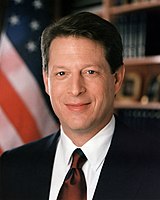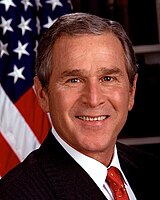2000 United States presidential election in New Jersey
| ||||||||||||||||||||||||||
| ||||||||||||||||||||||||||
 County Results
| ||||||||||||||||||||||||||
| ||||||||||||||||||||||||||
| Elections in New Jersey |
|---|
 |
In 2000, the United States presidential election in New Jersey, along with every U.S. state and Washington, D.C., took place on November 7, 2000 as part of the 2000 United States presidential election. The major party candidates were Democratic Vice President Al Gore of the incumbent administration and Republican Governor of Texas George W. Bush, son of the 41st U.S. president, George H. W. Bush. Owing to the indirect system of voting used in U.S. presidential elections, George W. Bush narrowly defeated Gore in Electoral College votes despite that Gore earned a higher percentage of the popular vote. Green Party candidate Ralph Nader, the only third-party candidate represented on most states' ballots, came in a distant third.
Although New Jersey had voted for Democrat Bill Clinton in the past two elections (1992 and 1996),[1] it was considered a potential swing state in 2000 because pre-election polling data showed it to be a close race.[2][3] Al Gore won 56% of NJ's popular vote, beating out George W. Bush by about a 16% margin, with Gore's biggest margins of victory in Essex County and Hudson County where he won over 70% of the vote. Bush won 7 counties with his biggest margins being just over 57% in Hunterdon County and Sussex County. Nader got over 4% of the vote in counties in the northwest of the state, while taking 3% statewide.[4] This was also the first presidential election since 1976, in which New Jersey would back the losing candidate as well. As of the 2020 presidential election[update], this is the last election in which Monmouth County voted for the Democratic candidate.
Bush became the first Republican to win the White House without carrying Bergen County, Burlington County, or Monmouth County, as well as the state of New Jersey since Benjamin Harrison in 1888. Bush became the first Republican to win without Union County since James A. Garfield in 1880. Bush was the first Republican to ever win the Presidency without Passaic and Gloucester counties, and the only Republican to ever win without Salem County.
General Election
Polling
| Poll source | Date(s) administered |
Sample size |
Margin of error |
Al Gore (D) |
George W. Bush (R) |
Ralph Nader (G) |
Patrick Buchanan (Ref) |
Undecided |
|---|---|---|---|---|---|---|---|---|
| The New York Times | October 12–15, 2000 | 908 RV | ± 3% | 49% | 34% | 8% | 1% | 8% |
Results
| 2000 United States presidential election in New Jersey[5] | ||||||
|---|---|---|---|---|---|---|
| Party | Candidate | Votes | Percentage | Electoral votes | ||
| Democratic | Al Gore | 1,788,850 | 56.13% | 15 | ||
| Republican | George W. Bush | 1,284,173 | 40.29% | 0 | ||
| Green | Ralph Nader | 94,554 | 2.97% | 0 | ||
| Reform | Pat Buchanan | 6,989 | 0.22% | 0 | ||
| Libertarian | Harry Browne | 6,312 | 0.20% | 0 | ||
| Natural Law | John Hagelin | 2,215 | 0.07% | 0 | ||
| Socialist | David McReynolds | 1,880 | 0.06% | 0 | ||
| Constitution | Howard Phillips | 1,409 | 0.04% | 0 | ||
| Socialist Workers | James Harris | 844 | 0.03% | 0 | ||
| Totals | 3,187,226 | 100.00% | 15 | |||
| Voter Turnout (Voting age/Registered) | 50%/68% | |||||
By county
| County | Al Gore | George W. Bush | Others | Margin | Total Votes | ||||
|---|---|---|---|---|---|---|---|---|---|
| # | % | # | % | # | % | # | % | ||
| Atlantic | 52,880 | 58.04% | 35,593 | 39.07% | 2,629 | 2.89% | 17,287 | 18.98% | 91,102 |
| Bergen | 202,682 | 55.27% | 152,731 | 41.65% | 11,308 | 3.08% | 49,951 | 13.62% | 366,721 |
| Burlington | 99,506 | 56.05% | 72,254 | 40.70% | 5,781 | 3.26% | 27,252 | 15.35% | 177,541 |
| Camden | 127,166 | 64.60% | 62,464 | 31.73% | 7,231 | 3.67% | 64,702 | 32.87% | 196,861 |
| Cape May | 22,189 | 46.62% | 23,794 | 49.99% | 1,611 | 3.38% | -1,605 | -3.37% | 47,594 |
| Cumberland | 28,188 | 57.90% | 18,882 | 38.78% | 1,614 | 3.32% | 9,306 | 19.12% | 48,684 |
| Essex | 185,505 | 71.47% | 66,842 | 25.75% | 7,226 | 2.78% | 118,663 | 45.71% | 259,573 |
| Gloucester | 61,095 | 57.48% | 42,315 | 39.81% | 2,888 | 2.72% | 18,780 | 17.67% | 106,298 |
| Hudson | 118,206 | 70.63% | 43,804 | 26.17% | 5,351 | 3.20% | 74,402 | 44.46% | 167,361 |
| Hunterdon | 21,387 | 37.88% | 32,210 | 57.05% | 2,858 | 5.06% | -10,823 | -19.17% | 56,455 |
| Mercer | 83,256 | 61.42% | 46,670 | 34.43% | 5,633 | 4.16% | 36,586 | 26.99% | 135,559 |
| Middlesex | 154,998 | 59.88% | 93,545 | 36.14% | 10,306 | 3.98% | 61,453 | 23.74% | 258,849 |
| Monmouth | 131,476 | 50.15% | 119,291 | 45.51% | 11,374 | 4.34% | 12,185 | 4.65% | 262,141 |
| Morris | 88,039 | 42.63% | 111,066 | 53.78% | 7,403 | 3.58% | -23,027 | -11.15% | 206,508 |
| Ocean | 102,104 | 47.18% | 105,684 | 48.84% | 8,605 | 3.98% | -3,580 | -1.65% | 216,393 |
| Passaic | 90,324 | 57.69% | 61,043 | 38.99% | 5,206 | 3.32% | 29,281 | 18.70% | 156,573 |
| Salem | 13,718 | 50.86% | 12,257 | 45.44% | 997 | 3.70% | 1,461 | 5.42% | 26,972 |
| Somerset | 56,232 | 46.71% | 59,725 | 49.61% | 4,420 | 3.67% | -3,493 | -2.90% | 120,377 |
| Sussex | 21,353 | 37.14% | 33,277 | 57.88% | 2,860 | 4.97% | -11,924 | -20.74% | 57,490 |
| Union | 112,003 | 60.10% | 68,554 | 36.78% | 5,816 | 3.12% | 43,449 | 23.31% | 186,373 |
| Warren | 16,543 | 40.55% | 22,172 | 54.34% | 2,086 | 5.11% | -5,629 | -13.80% | 40,801 |
| Total | 1,788,850 | 56.14% | 1,284,173 | 40.30% | 113,203 | 3.55% | 504,677 | 15.84% | 3,186,226 |
Counties that flipped from Democratic to Republican
- Cape May (largest municipality: Lower Township)
- Ocean (largest municipality: Lakewood Township)
By congressional district
Gore won 11 of 13 congressional districts, including four that elected Republicans.[6]
| District | Gore | Bush | Representative |
|---|---|---|---|
| 1st | 63.90% | 32.89% | Rob Andrews |
| 2nd | 54.78% | 42.55% | Frank LoBiondo |
| 3rd | 53.45% | 43.41% | Jim Saxton |
| 4th | 52.28% | 44.55% | Chris Smith |
| 5th | 44.64% | 51.69% | Marge Roukema |
| 6th | 57.72% | 38.37% | Frank Pallone Jr. |
| 7th | 54.19% | 42.79% | Bob Franks |
| Mike Ferguson | |||
| 8th | 61.05% | 36.25% | Bill Pascrell |
| 9th | 63.32% | 33.64% | Steve Rothman |
| 10th | 84.70% | 13.72% | Donald Payne |
| 11th | 43.36% | 53.50% | Rodney Frelinghuysen |
| 12th | 50.90% | 45.57% | Rush Holt Jr. |
| 13th | 72.35% | 25.33% | Bob Menendez |
Electors
Technically the voters of NJ cast their ballots for electors: representatives to the Electoral College. NJ is allocated 15 electors because it has 13 congressional districts and 2 senators. All candidates who appear on the ballot or qualify to receive write-in votes must submit a list of 15 electors, who pledge to vote for their candidate and his or her running mate. Whoever wins the majority of votes in the state is awarded all 15 electoral votes. Their chosen electors then vote for president and vice president. Although electors are pledged to their candidate and running mate, they are not obligated to vote for them. An elector who votes for someone other than his or her candidate is known as a faithless elector.
The electors of each state and the District of Columbia met on December 18, 2000[7] to cast their votes for president and vice president. The Electoral College itself never meets as one body. Instead the electors from each state and the District of Columbia met in their respective capitols.
The following were the members of the Electoral College from the state. All were pledged to and voted for Gore and Lieberman:[8]
- Paul M. Bangiola
- Angelo R. Bianchi
- Mamie Bridgeforth
- Dennis P. Collins
- John Garrett
- Deborah Lynch
- Patricia McCullough
- John McGreevey
- June B. Montag
- Jeffrey L. Nash
- Barbara A. Plumeri
- Julia Valdivia
- Stephen S. Weinstein
- Charles Wowkanech
See also
References
- ^ "New Jersey Elected Officials Lookup". 270toWin.com. Retrieved December 1, 2016.
- ^ Jacobs, Andrew (August 19, 2000), "The 2000 Campaign: The Impressions -- New Jersey; In a Swing State, Cheers and Doubts", The New York Times, retrieved December 1, 2016
- ^ Marks, Peter (July 23, 2000), "July 16–22; Making Margin Calls in a Tightening Race", The New York Times, retrieved December 1, 2016
- ^ Leip, Dave (n.d.), "2016 Presidential General Election Results", Atlas of the U.S. Presidential Elections, retrieved December 1, 2016
- ^ "How close were U.S. Presidential Elections?". Archived from the original on August 25, 2012. Retrieved November 23, 2015.
- ^ https://uselectionatlas.org/RESULTS/data.php?year=2000&fips=34&f=0&off=0&elect=0&datatype=cd&def=1 [bare URL]
- ^ Leip, Dave (n.d.), "2000 Events Timeline - Post-Election", Atlas of the U.S. Presidential Elections, retrieved December 1, 2016
- ^ Whitson, James R. (n.d.), "Overview of the 2000 Election", President Elect, archived from the original on February 12, 2012, retrieved December 1, 2016



